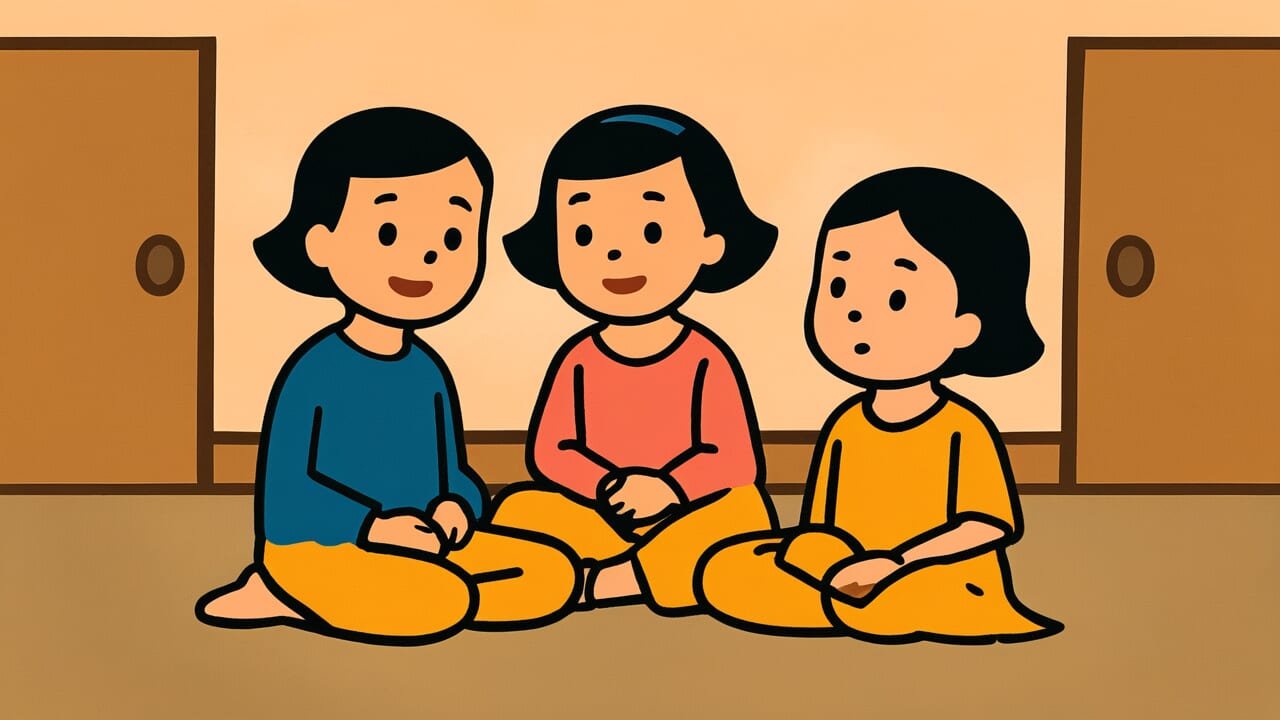How to Read “Three children without owing or borrowing”
Owazu karazu ni ko sannin
Meaning of “Three children without owing or borrowing”
This proverb means that if you live within your income without taking on debt, you can easily raise three children.
It teaches the importance of living a steady life that matches your means, without overreaching.
This saying is used when teaching young people about life planning. It’s also used to caution someone considering unwise borrowing.
People also use it to praise those who live modest but honest lives.
Today, planned borrowing like mortgages and education loans is common. But this proverb’s message is about avoiding debt beyond your ability to repay.
The positive message is clear: if you live according to your income, you can support a family and raise children.
It shows universal wisdom that steadiness is the foundation of family happiness.
Origin and Etymology
The exact first appearance of this proverb in literature is unclear. However, it likely emerged from the everyday sensibilities of common people during the Edo period.
The expression “without owing or borrowing” refers to not carrying debt. It means not borrowing money from others.
In Edo period commoner society, debt was a major factor that could ruin lives. Money borrowed from loan sharks would snowball rapidly.
Family separations were not uncommon. In this harsh reality, people deeply understood the importance of living within their means.
The specific number “three children” is particularly interesting. Considering average family size in the Edo period, three children was not a small number.
This proverb shows hope: “You can’t live luxuriously, but you can build a proper family.” It contains the wisdom and hope of common people.
It says that by living steadily without relying on debt, you can achieve ordinary happiness.
This expression about living according to your station conveys the life philosophy of people who lived honestly despite economic hardship.
Usage Examples
- Our family lived with three children without owing or borrowing, so even though we were poor, our hearts were rich
- He raised three children without owing or borrowing and did it splendidly—he’s truly a steady person
Universal Wisdom
The proverb “Three children without owing or borrowing” contains deep insight into how humans experience happiness.
Why did our ancestors connect debt-free living with family happiness?
They knew from experience that peace of mind comes not from what you have, but from what you don’t owe.
No matter how wealthy your lifestyle, the pressure of repayment eats away at your heart. Conversely, even in modest circumstances, if you owe nothing to anyone, you can feel free and calm.
This proverb also addresses the fundamental human challenge of “knowing what is enough.” Human desires have no limits.
It’s natural to want a better life than your neighbor, better education for your children. But if you chain yourself with debt for those desires, you lose even the happiness you could have had.
The specific number of three children symbolizes “ordinary happiness.” Not special luxury, but the sound of family laughter and warmth around the dinner table.
This proverb quietly tells us that such everyday happiness is actually the most important thing in life.
When AI Hears This
Financial engineering proves mathematically that when you diversify assets into three or more, risk drops sharply.
With just one, you face 100 percent of failure’s impact. But split into three, they compensate for each other and overall volatility decreases.
Interestingly, adding a fourth or fifth doesn’t increase risk reduction much. The number three is the “minimum effective diversification number” with the best cost-benefit balance.
This proverb’s “three children” applies this theory to human relationships. With only one child, if something happens to that child, the whole family faces crisis.
With two, the risk of over-dependence on one remains. But with three, even if one is sick, one moves far away, or one struggles financially, the other children can support each other.
More important is the constraint “without owing or borrowing.” In finance, debt can increase returns, but it also increases risk.
This proverb shows a strategy for designing a stable old age. It eliminates the risk of debt—no leverage—while building a human portfolio of three children.
Edo period commoners found the optimal solution without equations.
Lessons for Today
This proverb teaches us the answer to what true wealth really is.
In an age where credit cards and loans are normal, we may be too accustomed to “getting it right now.”
What matters is the courage to honestly face your economic limits. You don’t need to panic seeing others’ glamorous lives on social media.
True security lies in the life you build with your income, at your pace.
Debt-free living gives you freedom of choice. You don’t have to endure a job you hate.
You gain room to take on new challenges. Instead of days chasing payments, you can have nights where you sleep looking forward to tomorrow.
Of course, this doesn’t reject planned borrowing for housing or education. But before that, stop and think.
Is it truly necessary? With choices that match your means, can’t you and your family be happy enough?
Steadiness isn’t cowardice—it’s the strength to protect your family.



Comments